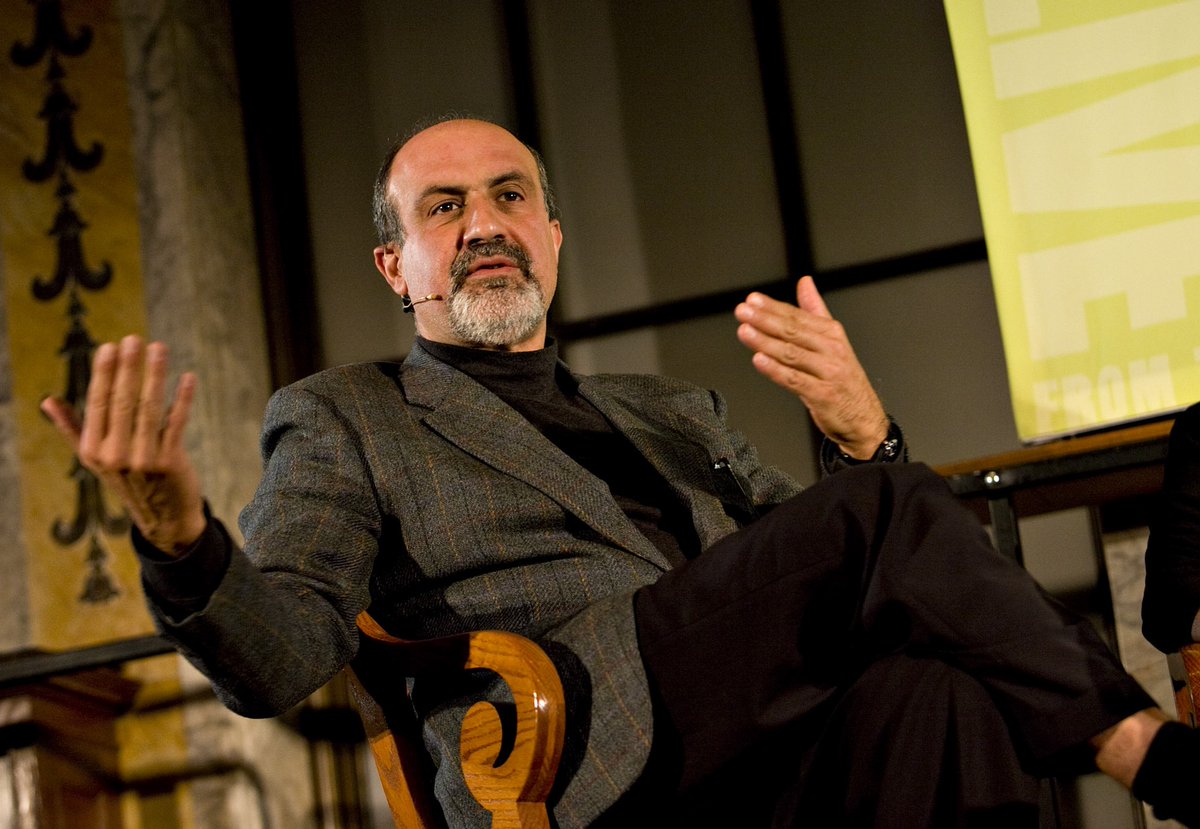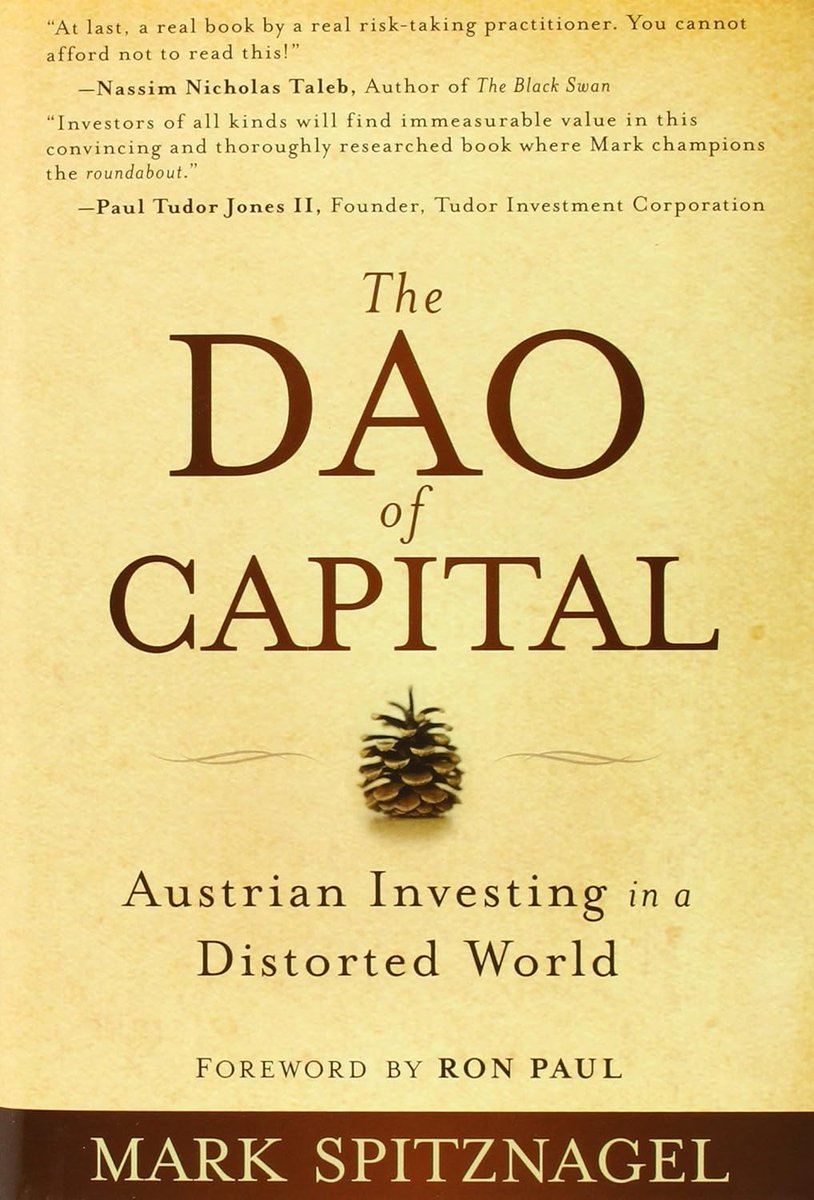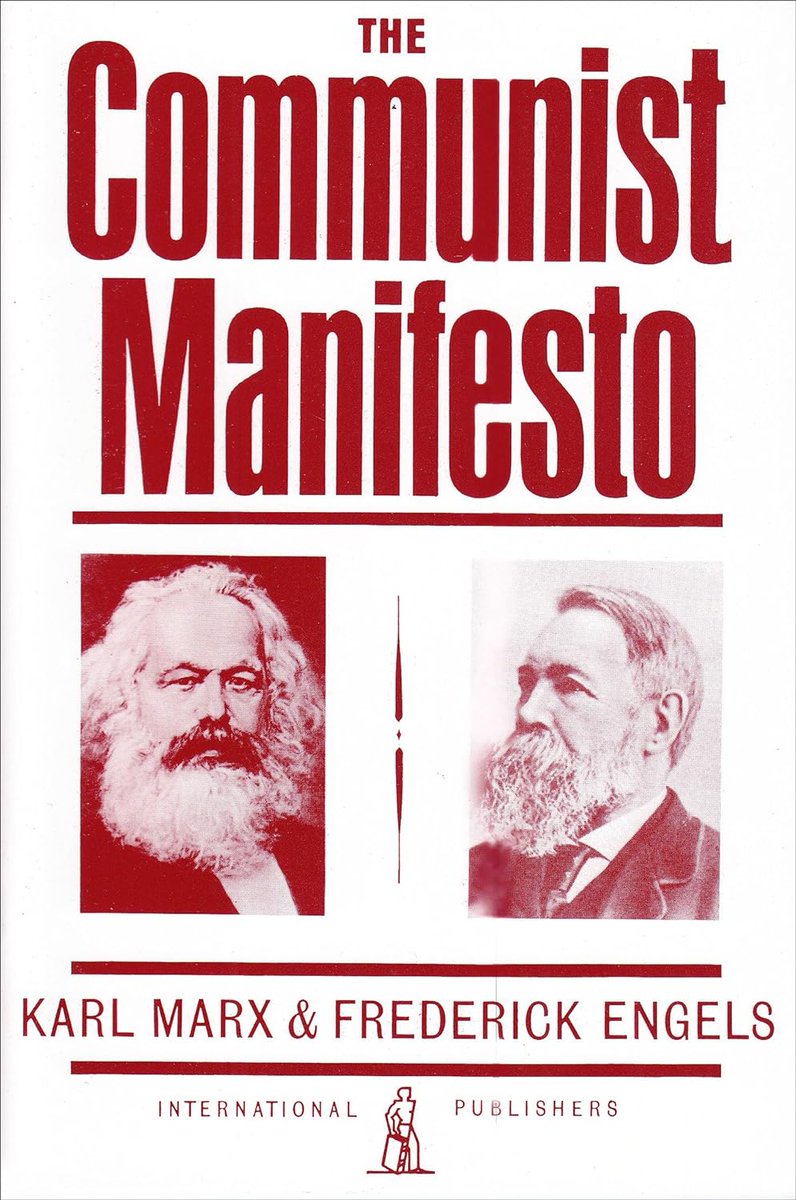“A good book gets better at the second reading. A great book at the third. Any book not worth rereading isn’t worth reading.”, says Nassim Nicholas Taleb.
He is the author of the Incerto, a five-volume philosophical essay on uncertainty.
25 books recommended by @nntaleb 🧵
He is the author of the Incerto, a five-volume philosophical essay on uncertainty.
25 books recommended by @nntaleb 🧵

He also adds,
“To see if a book is real, ask 10 people of different backgrounds & professions to summarize it. If the summaries are similar, the book will not survive as it can be shortened to a journal article. The more the summaries diverge, the higher the dimensionality of the book.”
This list has been curated from his countless books recommendations over the years on Twitter, Amazon reviews and his interviews.
“To see if a book is real, ask 10 people of different backgrounds & professions to summarize it. If the summaries are similar, the book will not survive as it can be shortened to a journal article. The more the summaries diverge, the higher the dimensionality of the book.”
This list has been curated from his countless books recommendations over the years on Twitter, Amazon reviews and his interviews.
1) Zero to One by Peter Thiel
“When a risk taker writes a book, read it. In the case of Peter Thiel, read it twice. Or to be safe, three times. This is a classic.” ― Nassim N. Taleb
“When a risk taker writes a book, read it. In the case of Peter Thiel, read it twice. Or to be safe, three times. This is a classic.” ― Nassim N. Taleb

2) Thinking, Fast and Slow by Daniel Kahneman
“This is a landmark book in social thought, in the same league as The Wealth of Nations by Adam Smith and The Interpretation of Dreams by Sigmund Freud.”
― Nassim N. Taleb
“This is a landmark book in social thought, in the same league as The Wealth of Nations by Adam Smith and The Interpretation of Dreams by Sigmund Freud.”
― Nassim N. Taleb

3) Deep Learning by Ian Goodfellow, Yoshua Bengio and Aaron Courville
“Very clear exposition, does the math without getting lost in the details. Although many of the concepts of the introductory first 100 pages can be found elsewhere, they are presented with remarkable cut-to-the-chase clarity.” ― Nassim N. Taleb
“Very clear exposition, does the math without getting lost in the details. Although many of the concepts of the introductory first 100 pages can be found elsewhere, they are presented with remarkable cut-to-the-chase clarity.” ― Nassim N. Taleb

4) Who We Are and How We Got Here: Ancient DNA and the New Science of the Human Past by David Reich
“Finally, science enters historical fields. This is a monument, not just a book. And the beginning of a new cultural program.” ― Nassim N. Taleb
“Finally, science enters historical fields. This is a monument, not just a book. And the beginning of a new cultural program.” ― Nassim N. Taleb

5) Probability, Random Variables and Stochastic Processes by Athanasios Papoulis and S Pillai
“Found no substitute for a difficult subject.
When readers and students ask me for a useable book for nonmathematicians to get into probability (or a probabilistic approach to statistics), before embarking into deeper problems, I suggest this book by the Late A. Papoulis. I even recommend it to mathematicians as their training often tends to make them spend too much time on limit theorems and very little on the actual ‘plumbing’.”
― Nassim N. Taleb
“Found no substitute for a difficult subject.
When readers and students ask me for a useable book for nonmathematicians to get into probability (or a probabilistic approach to statistics), before embarking into deeper problems, I suggest this book by the Late A. Papoulis. I even recommend it to mathematicians as their training often tends to make them spend too much time on limit theorems and very little on the actual ‘plumbing’.”
― Nassim N. Taleb

6) The Elements of Statistical Learning: Data Mining, Inference, and Prediction by Trevor Hastie, Robert Tibshirani and Jerome Friedman
“The reference. Very comprehensive, sufficiently technical to get most of the plumbing behind machine learning. Very useful as a reference book (actually, there is no other complete reference book). Uses some mathematical statistics without the burdens of measure theory and avoids the obvious but complicated proofs.”
― Nassim N. Taleb
“The reference. Very comprehensive, sufficiently technical to get most of the plumbing behind machine learning. Very useful as a reference book (actually, there is no other complete reference book). Uses some mathematical statistics without the burdens of measure theory and avoids the obvious but complicated proofs.”
― Nassim N. Taleb

7) Statistical Models: Theory and Practice by David A. Freedman
“The Best Statistics Book I've Seen. I spent my life focusing on the errors of statistics and how they sometimes fail us in real life, because of the misinterpretation of what the techniques can do for you.
This book is outstanding in the following two aspects:
1) It is of immense clarity, embedding everything in real situations,
2) It uses the real-life situation to critique the statistical model and show you the limit of statistics.
For instance, he shows a few anecdotes here and there to illustrate how correlation between two variables might not mean anything causal, or how asymptotic properties may not be relevant in real life. This is the first statistics book I've seen that cares about presenting statistics as a tool to GET TO THE TRUTH.”
― Nassim N. Taleb
“The Best Statistics Book I've Seen. I spent my life focusing on the errors of statistics and how they sometimes fail us in real life, because of the misinterpretation of what the techniques can do for you.
This book is outstanding in the following two aspects:
1) It is of immense clarity, embedding everything in real situations,
2) It uses the real-life situation to critique the statistical model and show you the limit of statistics.
For instance, he shows a few anecdotes here and there to illustrate how correlation between two variables might not mean anything causal, or how asymptotic properties may not be relevant in real life. This is the first statistics book I've seen that cares about presenting statistics as a tool to GET TO THE TRUTH.”
― Nassim N. Taleb

8) Probability Theory (Courant Lecture Notes) by S. R. S. Varadhan
“A gem. I know which books I value when I end up buying a second copy after losing the first one. This book gives a complete overview of the basis of probability theory with some grounding in measure theory and presents the main proofs.
It is remarkable because of its concision and completeness: visibly prof Varadhan lectured from these notes and kept improving on them until we got this gem. There is not a single sentence too many, yet nothing is missing.”
― Nassim N. Taleb
“A gem. I know which books I value when I end up buying a second copy after losing the first one. This book gives a complete overview of the basis of probability theory with some grounding in measure theory and presents the main proofs.
It is remarkable because of its concision and completeness: visibly prof Varadhan lectured from these notes and kept improving on them until we got this gem. There is not a single sentence too many, yet nothing is missing.”
― Nassim N. Taleb

9) The Statistical Mechanics of Financial Markets by Johannes Voit
“Very useful book, particularly in what concerns alternative L-Stable distributions. It provides an excellent perspective on the statistical approach to asset price dynamics. Very clear and to the point.”
― Nassim N. Taleb
“Very useful book, particularly in what concerns alternative L-Stable distributions. It provides an excellent perspective on the statistical approach to asset price dynamics. Very clear and to the point.”
― Nassim N. Taleb

11) The Dawn of Everything: A New History of Humanity by David Graeber and David Wengrow
“This is not a book. This is an intellectual feast. There is not a single chapter that does not (playfully) disrupt well seated intellectual beliefs. It is deep, effortlessly iconoclastic, factually rigorous, and pleasurable to read.” ― Nassim N. Taleb
“This is not a book. This is an intellectual feast. There is not a single chapter that does not (playfully) disrupt well seated intellectual beliefs. It is deep, effortlessly iconoclastic, factually rigorous, and pleasurable to read.” ― Nassim N. Taleb

12) Order without Design: How Markets Shape Cities by Alain Bertaud
“Outstanding book. Bertaud knows cities inside out. It is a pleasure to read something by a person who knows his subject in so much depth. He reveals how planning can mess up cities, how the market is more intelligent than planners, etc.” ― Nassim N. Taleb
“Outstanding book. Bertaud knows cities inside out. It is a pleasure to read something by a person who knows his subject in so much depth. He reveals how planning can mess up cities, how the market is more intelligent than planners, etc.” ― Nassim N. Taleb

13) The Dao of Capital by Mark Spitznagel
“At last, a real book by a real risk-taking practitioner. The Dao of Capital mixes (rather, unifies) personal risk-taking with explanations of global phenomena. You cannot afford not to read this!” ― Nassim N. Taleb
“At last, a real book by a real risk-taking practitioner. The Dao of Capital mixes (rather, unifies) personal risk-taking with explanations of global phenomena. You cannot afford not to read this!” ― Nassim N. Taleb

14) Good Calories, Bad Calories by Gary Taubes
“Read it twice, once for the diet, once for the rich document in the history of science.”
― Nassim N. Taleb
“Read it twice, once for the diet, once for the rich document in the history of science.”
― Nassim N. Taleb

15) Seeking Wisdom: From Darwin to Munger by Peter Bevelin
“A wonderful book on wisdom and decision-making written by a wise decision-maker. This is the kind of book you read first, then leave by your bedside and re-read a bit every day, so you can slowly soak up the wisdom. It is sort of Montaigne but applied to business, with a great investigation of the psychological dimension of decision-making.
I like the book for many reasons --the main one is that it was written by a practitioner who knows what he wants, not by an academic.”
― Nassim N. Taleb
“A wonderful book on wisdom and decision-making written by a wise decision-maker. This is the kind of book you read first, then leave by your bedside and re-read a bit every day, so you can slowly soak up the wisdom. It is sort of Montaigne but applied to business, with a great investigation of the psychological dimension of decision-making.
I like the book for many reasons --the main one is that it was written by a practitioner who knows what he wants, not by an academic.”
― Nassim N. Taleb

16) Alchemy by Rory Sutherland
“This is a breakthrough book. Alchemy is wonderfully applicable to about everything in life. Furthermore, it is funny as hell.” ― Nassim N. Taleb
“This is a breakthrough book. Alchemy is wonderfully applicable to about everything in life. Furthermore, it is funny as hell.” ― Nassim N. Taleb

17) The Formula: The Universal Laws of Success by Albert-László Barabási
“This is not just an important but an imperative project: to approach the problem of randomness and success using the state of the art scientific arsenal we have. Barabasi is the person.”
― Nassim N. Taleb
“This is not just an important but an imperative project: to approach the problem of randomness and success using the state of the art scientific arsenal we have. Barabasi is the person.”
― Nassim N. Taleb

18) Models.Behaving.Badly by Emanuel Derman
“Emanuel Derman has written my kind of a book, an elegant combination of memoir, confession, and essay on ethics, philosophy of science and professional practice.
He convincingly establishes the difference between model and theory and shows why attempts to model financial markets can never be genuinely scientific. It vindicates those of us who hold that financial modeling is neither practical nor scientific. Exceedingly readable.”
― Nassim N. Taleb
“Emanuel Derman has written my kind of a book, an elegant combination of memoir, confession, and essay on ethics, philosophy of science and professional practice.
He convincingly establishes the difference between model and theory and shows why attempts to model financial markets can never be genuinely scientific. It vindicates those of us who hold that financial modeling is neither practical nor scientific. Exceedingly readable.”
― Nassim N. Taleb

19) Adapt: Why Success Always Starts with Failure by @TimHarford
“Adapt is a highly readable, even entertaining, argument against top-down design. It debunks the Soviet-Harvard command-and-control style of planning and approach to economic policies and regulations and vindicates trial and error (particularly the error part) as a means to economic and general progress. Very impressive!”
― Nassim N. Taleb
“Adapt is a highly readable, even entertaining, argument against top-down design. It debunks the Soviet-Harvard command-and-control style of planning and approach to economic policies and regulations and vindicates trial and error (particularly the error part) as a means to economic and general progress. Very impressive!”
― Nassim N. Taleb

20) Le labyrinthe des égarés by Amin Maalouf
“An excellent book on modern historical dynamics, covering the stories of the rise of Japan, the Soviet Union, China, & the U.S. I learned tons lot of stuff. It reads like a novel.
It’s the kind of book I didn’t know I had to read.”
― Nassim N. Taleb
“An excellent book on modern historical dynamics, covering the stories of the rise of Japan, the Soviet Union, China, & the U.S. I learned tons lot of stuff. It reads like a novel.
It’s the kind of book I didn’t know I had to read.”
― Nassim N. Taleb

21) The Invisible Gorilla: How Our Intuitions Deceive Us by Christopher Chabris and Daniel Simons
“The illusion of attention is one of the most important, surprising, and least known flaws in human thinking. This lucid book examines it in detail.” ― Nassim N. Taleb
“The illusion of attention is one of the most important, surprising, and least known flaws in human thinking. This lucid book examines it in detail.” ― Nassim N. Taleb

22) The Longevity Solution by Dr. James DiNicolantonio and Dr. Jason Fung
“Incredibly well made book by @drjasonfung and @drjamesdinic. They use the potent designation ‘nonfood items.’
I wonder how many nutritional studies would still hold their conclusions if we removed “nonfoods” from the tests. Science is hard.”
― Nassim N. Taleb
“Incredibly well made book by @drjasonfung and @drjamesdinic. They use the potent designation ‘nonfood items.’
I wonder how many nutritional studies would still hold their conclusions if we removed “nonfoods” from the tests. Science is hard.”
― Nassim N. Taleb

23) A New Kind of Science by Stephen Wolfram
“This book is not a book, but a monument. I have been reading rules from it for 10 years.”
― Nassim N. Taleb
“This book is not a book, but a monument. I have been reading rules from it for 10 years.”
― Nassim N. Taleb

24) Scale by Geoffrey West
“Each human should learn to read and write, to count, and for those who know how to count, scalability. Scaling is the most important yet most hidden and rarely discussed attribute—without understanding it one cannot possibly understand the world.
This book will expand your thinking from three dimensions to four. Get two copies, just in case you lose one.”
― Nassim N. Taleb
“Each human should learn to read and write, to count, and for those who know how to count, scalability. Scaling is the most important yet most hidden and rarely discussed attribute—without understanding it one cannot possibly understand the world.
This book will expand your thinking from three dimensions to four. Get two copies, just in case you lose one.”
― Nassim N. Taleb

25) A Man for All Markets by Edward O. Thorp
“Ed Thorp's memoir reads like a thriller – mixing wearable computers that would've made James Bond proud, shady characters, great scientists, and poisoning attempts.” ― Nassim N. Taleb
“Ed Thorp's memoir reads like a thriller – mixing wearable computers that would've made James Bond proud, shady characters, great scientists, and poisoning attempts.” ― Nassim N. Taleb

@stephen_wolfram @EdwardOThorp Thank you for going through the thread. Follow me at @readswithravi for more book learning, reviews, lessons and recommendations. Teach or share with others what you learn, that's how we grow.
Retweet the first tweet so you can share it with others.
Retweet the first tweet so you can share it with others.
https://twitter.com/readswithravi/status/1766843136507060279
• • •
Missing some Tweet in this thread? You can try to
force a refresh




















